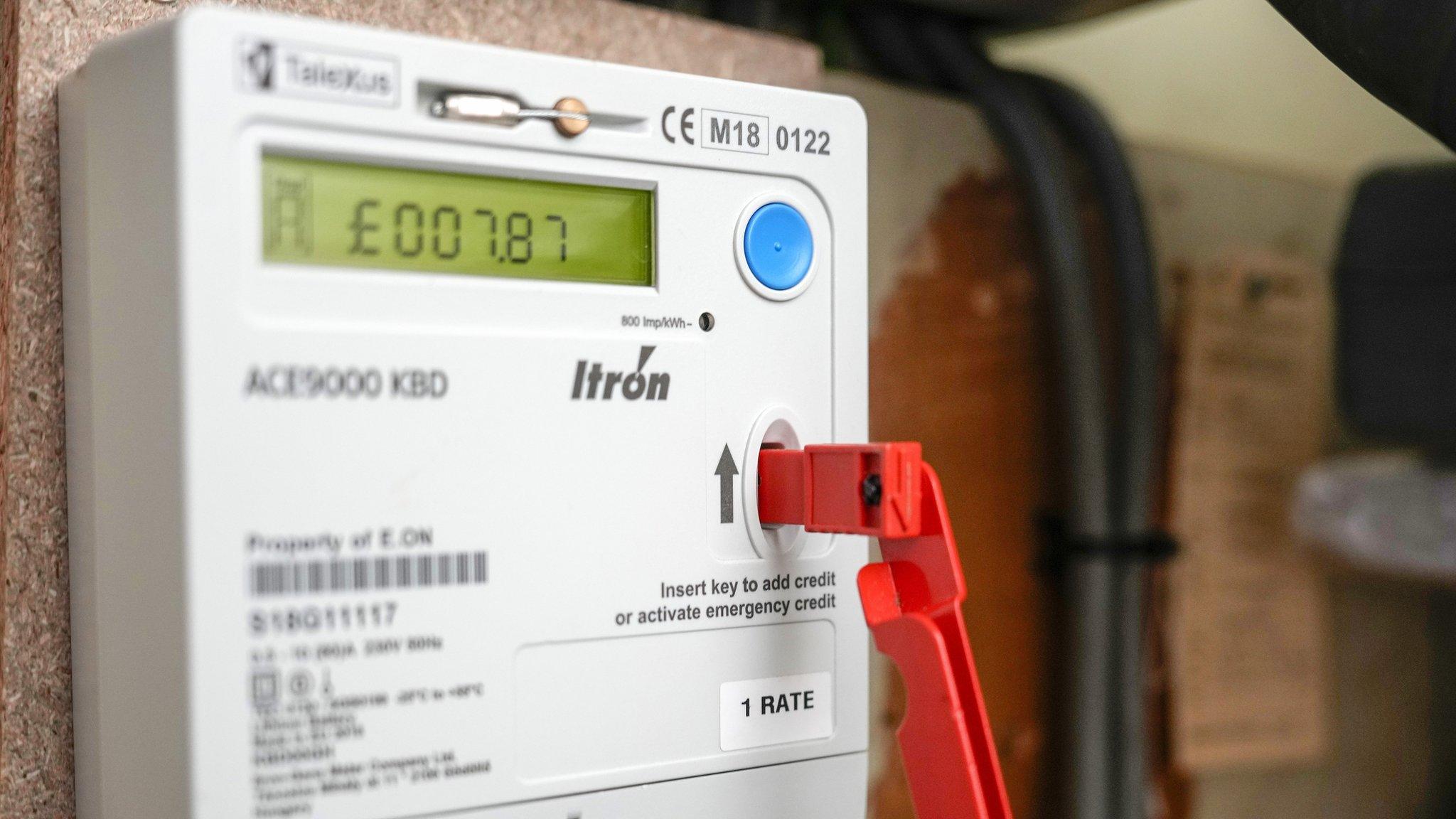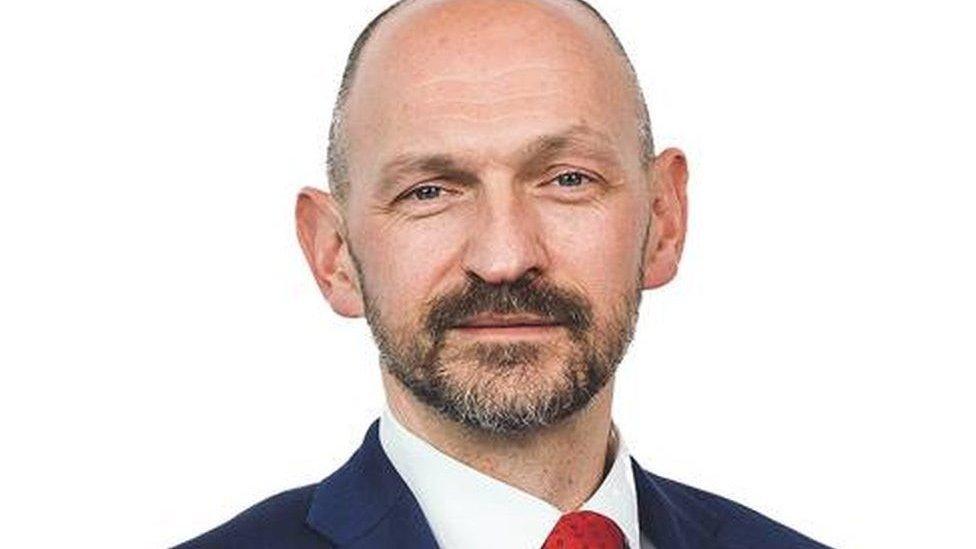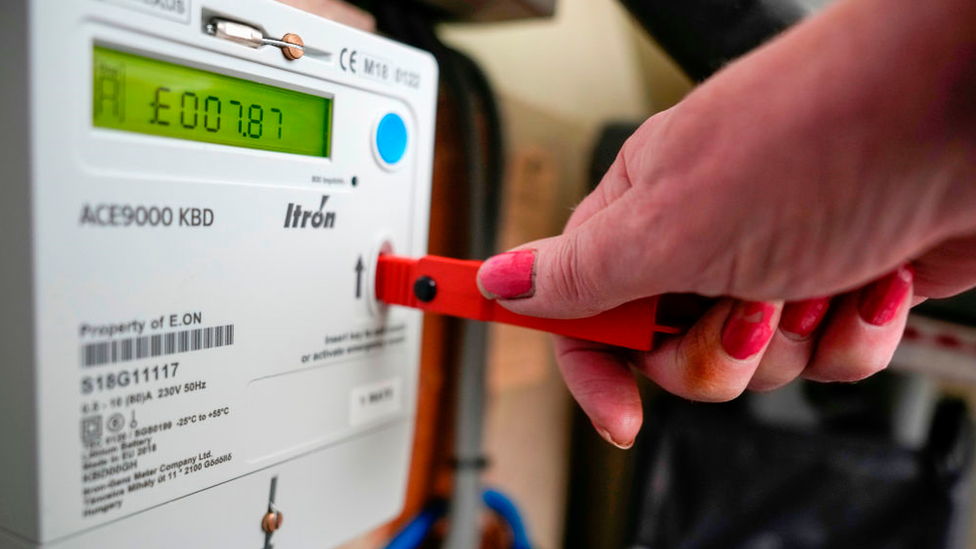Anger as prepayment energy meter force-fittings to be allowed again
- Published
- comments
Jonathan Brearley, Chief Exec of Ofgem, warns energy suppliers, 'your reputation is on the line'.
Tougher rules over which homes can be forcibly switched to a prepayment energy meter have been criticised by campaigners who want a total ban.
Customers must be given more chance to clear debts and forced meter fittings will be banned in homes with residents all aged over 85, regulator Ofgem said.
Charities say the measures are not enough because they are voluntary, but Ofgem says they will soon be mandatory.
Fitting was halted after agents broke into the homes of vulnerable people.
The investigation by The Times, exposing the actions of agents for British Gas, led to a public outcry.
Simon Francis, coordinator of the End Fuel Poverty Coalition, said the new rules "do not go far enough". Citizens Advice said they should be swiftly made mandatory.
A total ban on forcible fitting would need to be introduced by government ministers.
Energy Secretary Grant Shapps appeared to confirm the government would take action. Asked as he left Downing Street whether more would be done to control pre-payment meters, Mr Shapps said: "Yeah, we'll be on this."
Ofgem chief executive Jonathan Brearley said the regulator needed to balance managing debt, while also protecting vulnerable customers. However, he said firms' reputations were on the line if they failed to follow the rules.
"We cannot look at everything that suppliers do, so we cannot guarantee there will be no bad practice out there. But we have the ability to go deep into a company to see what is happening," he told the BBC's Today programme.

Tarique Chowdhury says suppliers could have done more
Questions have been raised about energy firms marking their own performance, but they will need to satisfy five conditions before they can resume force-fitting of meters from May. In practice, it could be months before some companies are able to start forcible installations again.
Ofgem said it would be turning the code into new mandatory rules, and would strengthen them if required.
Mr Brearley said there would be "much tighter" monitoring of the new rules. He said that if companies failed to adhere to the requirements then tighter regulations would be introduced that would be "against their commercial interests".
He said the regulator could call in information from smart meters and bodycam evidence to check companies' performance.
The plans are insufficient, according to Tarique Chowdhury, 55, who had a prepayment meter force-fitted in the autumn of 2020 after a previous tenant had built up debts.
He said that the "conveyor belt" approach to fittings had been wrong, and its forced nature "felt like being burgled". The new code, he said, lacked teeth.
"A loss of reputation is a risk these companies can take," he said, claiming that the companies could have spent money on proper checks.
Forced moves
Switching people onto prepayment meters without their consent has become more common since energy prices went up.
It can be done by warrant or remotely via smart meters, with suppliers saying it may help indebted customers manage their spending.
But campaigners say prepayment meters - which must be topped up - leave vulnerable customers at risk of running out of credit and losing access to light and heat.
All energy suppliers in England, Scotland and Wales have signed up to the code of conduct which sets out the practices they should adhere to when fitting the meters.
Under the rules, suppliers will now have to make at least 10 attempts to contact a customer and conduct a "site welfare visit" before a prepayment meter is installed.
Representatives fitting them will also have to wear body cameras or audio equipment to make sure the rules are followed.
In addition:
Those forced onto a prepay meter - either by warrant or remotely - will be given £30 of credit initially to reduce the risk of them losing supply
Suppliers will not be allowed to fit meters for customers over 85, without someone else in the house, or anyone with a terminal illness. Those with health conditions such as chronic bronchitis, emphysema and sickle cell disease, which could be worsened by living in a cold home, will also be exempt
Those who need a continuous supply for health reasons, and those physically or mentally unable to top up will not be switched
Suppliers have also been told to identify where meters were wrongfully installed and to return the customer to their previous tariff and offer compensation
If a customer has repaid what they owed, then their case can be reassessed and they may be able to move back off a prepayment meter.
However, there are concerns the rules will only protect the highest risk individuals.


For vulnerable customers in a "medium risk" category, suppliers will be required to carry out further risk assessments but can still go ahead with forced installations if they consider them justified.
Medium risk individuals could include elderly people aged between 75 and 84, parents of children under five years old, pregnant women and people with Alzheimer's disease among other conditions.
"What about elderly people below the age of 85? Also some disabled people could still miss out - people using power to charge their wheelchairs, for example. There will be people who aren't covered," said Mr Francis of the End Fuel Poverty Coalition.
Disability equality charity Scope is calling for an outright ban, warning the rules mean some disabled households could still have meters force-fitted.
An estimated 600,000 people were forced to switch to prepayment meters after struggling to pay their bills last year, up from 380,000 in 2021, according to Citizens Advice.
Even before force-fitting of meters could resume, companies should be satisfied they pass tests including an audit to uncover any wrongfully installed meters. Also, they must deal with any historical issues over meter fitting outlined by the regulator.
David Ford had debt agents arrive at his home in Brighton threatening to use a locksmith to break in and install a prepayment meter, which was later fitted.
He said that improvements should have been made to the system years ago, by the regulator and government.
"When this gets done it can leave you in a worse position," said Mr Ford, who - like his partner - has disabilities.
Suppliers have previously pointed out that if customer debts go unpaid, they will have to be covered eventually through everyone else's bill.

Have you had a prepayment meter forcibly installed? How are you coping with rising bill costs? Share your experiences by emailing haveyoursay@bbc.co.uk, external.
Please include a contact number if you are willing to speak to a BBC journalist. You can also get in touch in the following ways:
WhatsApp: +44 7756 165803
Tweet: @BBC_HaveYourSay, external
Please read our terms & conditions and privacy policy
If you are reading this page and can't see the form you will need to visit the mobile version of the BBC website to submit your question or comment or you can email us at HaveYourSay@bbc.co.uk, external. Please include your name, age and location with any submission.
Related topics
- Published14 March 2023

- Published22 March 2023

- Published12 March 2023
